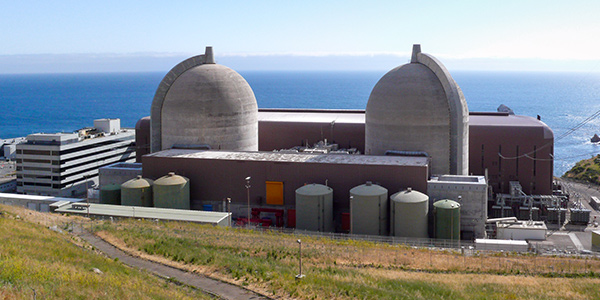The activist group Californians for Green Nuclear Power (CGNP) has updated its request that FERC overturn the planned closing of a California nuclear generating station in response to criticism from NERC and other respondents named in the original complaint (EL21-13).
CGNP’s complaint, filed in October, concerns Pacific Gas and Electric’s Diablo Canyon Power Plant, a facility comprising two nuclear reactors with a nameplate capacity of 2.3 GW that is scheduled to shut down by 2025. Diablo Canyon has operated since 1985; in 2019 it produced nearly 16.2 TWh of electricity, according to the U.S. Energy Information Administration, accounting for about 10% of in-state generation.
Initial Complaint Draws Harsh Response
CGNP describes its membership as scientists “dedicated to promoting the peaceful use of safe, carbon-free nuclear power.” In its filing, the group accused NERC, PG&E, WECC, NERC Blasts Calif. Nuclear Group’s Complaint.)
The respondents fired back in multiple separate responses, raising a number of issues with the complaint. NERC pointed out that CGNP cited no specific violations of its reliability standards, while PG&E asserted that “responsibility for electric generation resource planning … rests with state authorities” and that FERC involving itself in the matter would therefore be improper. CAISO and the California Public Utilities Commission called the legal basis for the complaint “unclear.”
In the amended complaint, CGNP aims to address the respondents’ objections by fleshing out its arguments, in particular the reliability standard it claims to be at issue — BAL-002-WECC-2a (Contingency reserve). The new filing also clarifies the specific actions the group is seeking from FERC:
- halt the respondents’ alleged violations through its “plenary jurisdiction”;
- issue the appropriate orders to ensure the region maintains a reliable supply of natural gas in the event of Diablo Canyon’s retirement;
- review CAISO’s loading order, which gives preference to renewable energy and distributed generation over nuclear and other resources for meeting demand, as “unduly preferential and discriminatory”; and
- disallow the cost recovery granted PG&E for the infrastructure needed to transmit Diablo Canyon’s power and investigate the effects of the facility’s closure on California electric rates.
Plant Closure a Recipe for Trouble
CGNP’s accusation rests on BAL-002-WECC-2a, a regional reliability standard that took effect in January 2017. The standard mandates the minimum contingency reserves that must be maintained by each balancing authority and reserve sharing group in order to “ensure reliability under normal and abnormal conditions.” The group alleges that “retiring Diablo will result in an unreliable grid” by removing the facility’s generation from the Western Interconnection.
What is being lost, according to the complaint, is not the sheer generating power of Diablo Canyon, which PG&E expects to replace with “a portfolio of [greenhouse gas]-free resources.” Instead, CGNP is concerned with the uniquely stable power supply that the plant provides.
Currently, PG&E can depend on Diablo Canyon to keep generating power, rain or shine — a level of confidence that solar and wind generation can never provide, according to CGNP. It is not alone in this assessment: Multiple industry participants have confirmed that the closure of the nuclear plant will remove significant baseload capacity from the grid, including stakeholders at WECC’s second Resource Adequacy Forum this month. (See Experts Urge West to Address RA Shortfall Immediately.)
One option when renewable resources falter is natural gas, but this too is not without risk. The region’s gas pipelines are not only aging but are also vulnerable to aseismic creep, a phenomenon involving the relative motion of Earth’s tectonic plates without earthquakes.
Over time this slow but inexorable movement can bend and break pipelines. CGNP claims its scientists found that one pipeline crossing the San Andreas Fault was bent by about 32 inches, the result of an estimated 23 years of accumulated creep.
According to the complaint, by shutting down Diablo Canyon, PG&E, CAISO and the CPUC will move from a stable facility with an excellent operational record to a mix of questionably reliable resources. Their disregard of the risk created is grounds for FERC to exercise its own authority to enforce BAL-002-WECC-2a by halting the Diablo Canyon closure and ordering its own investigation into the shutdown’s potential impact on reliability for the power grid and the gas pipeline system, the group says.
Fairness for Ratepayers Questioned
In addition to the alleged reliability standard violation, CGNP also takes issue with the loading order in California’s Energy Action Plan, created in 2003 by the CPUC, the California Power Authority and the California Energy Commission. The order requires that CAISO meet electricity demand with renewable energy resources and distributed generation before turning to non-renewable resources; CGNP calls this order “unduly preferential and discriminatory” and requests an investigation into whether closing Diablo Canyon “will result in market design flaws.”
Finally, the organization accuses PG&E of pulling a bait-and-switch by obtaining permission from FERC to recover some costs of the Diablo Canyon project from ratepayers who will not reap the expected benefits from the project because of its early termination (ER19-2568). CGNP requests that the commission hold a hearing on whether the utility’s rates can still be justified based on the closure of Diablo Canyon.
“Taking 10% of the state’s [baseload] power offline … and then building new lines through wildfire-prone regions, to deliver less reliable power, is neither just nor reasonable,” CGNP says.





